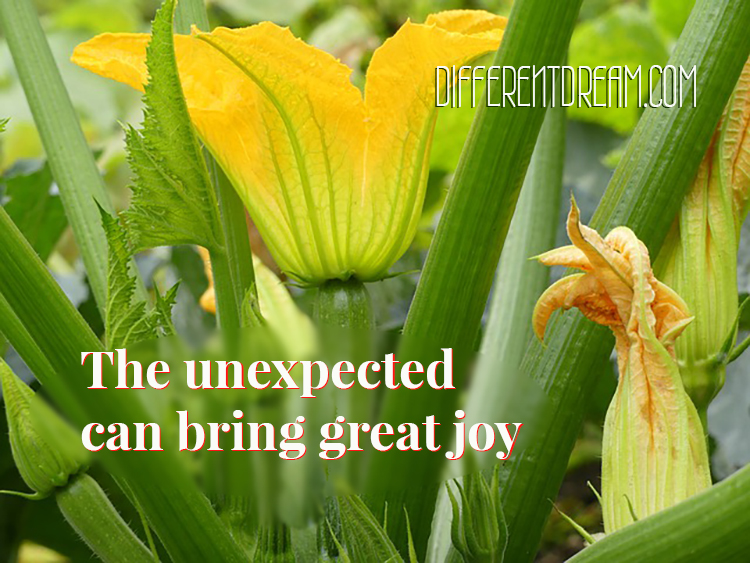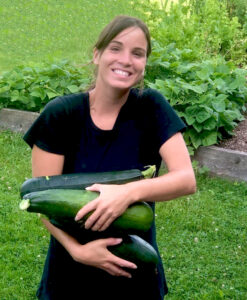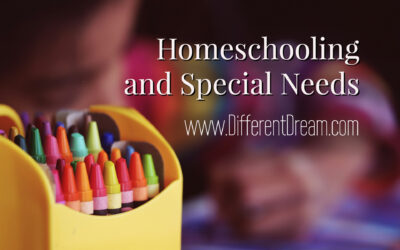Finding Joy in the Garden of Disability and Special Needs

Finding joy in the garden of disability and special needs is a lot like finding zucchinis in the pumpkin patch. Both provide abundant and delicious harvests as guest blogger Heather Johnson explains in this post.
I kneel in my garden bed. It has been freshly tilled and spread with a layer of composted manure. We have an ample supply, given that we have four horses on our farm. As rust-breasted bluebirds flit to-and-from nearby nesting boxes, I’m thinking about raising vegetables, flowers, and kids with special needs for the past twenty-five years. Today, pumpkins are my main goal.
I pull soil toward me with my arms, making six large mounds, each six feet apart. I plunge twelve cream-colored teardrops into each heap of sun-kissed earth.
Finished, I stand and brush off my dirt-caked knees, grab the garden hose, and water the invisible seed wonders—seeds holding life just waiting to break through. Kind of like babies waiting for birth.
Many years ago, after planting my first pumpkins, I waited more than a week for them to peek green through the brown. When the pumpkin plants sprouted their first leaves, I noticed some didn’t look like others. Some leaves were rounded, others were angular with slightly jagged edges. Suddenly, I realized I didn’t have just pumpkins—I had zucchini. The seed pack was mixed.
I didn’t get what I expected.
I wanted a patch of large pumpkins to place along our flower garden paths in October. Not having the heart to discard tender new life, I decided to grow pumpkins and zucchini together, learning about their different growth rates, tending needs, and harvest times. Little did I know how unexpected zucchini would bring me abundant joy.
Kind of like raising our three kids with invisible disabilities.
Growing our family has been like growing my garden of unexpected. When we adopted our three kids from Russia twenty-five years ago, we didn’t know they would grow quite differently from other kids. In “seedling” form, they looked the same—no outward appearance of difference. Once they began growing, however, we realized our family “garden patch” would need different tending.
We couldn’t follow the typical growth directions of parenting books or others’ advice based on their own parenting prowess. Our “seeds” were not like other family’s “seeds”. I believed then, and I still believe now, that regardless of growth rates or harvest yields, all life is precious. All life has purpose. All life has promise.
Truth be told, tending our flower and vegetable gardens often exhausts and stretches my muscles into an ache. The same held true for raising kids with invisible disabilities. I was stretched beyond what I thought I could bear, exhausted and achy of heart sometimes. Maybe you too?
May I offer you a refreshing cup of good news?
Whether we’re tending flower and vegetable gardens or our own garden of children, harvest comes, sooner or later. Miniature harvests occur all along the way too. The first ripe raspberry, sweet juice on the tongue. The first witness of a child performing a selfless act to help a hurting other.
Then come the larger, longer growing harvests.
Our kids are not children anymore. They are 30, 28, and 24. They completed high school with special services, healed from multiple surgeries, and overcame emotional difficulties. With assistance, all found employment and enjoy living structured, productive lives. Each are kind and considerate. I love them all, with all their differing abilities, and have come to realize how they’ve tended to my soul all these years as I’ve tended to theirs.

Our unexpected family produced a harvest far more abundant than I imagined. We’ve grown love, joy, peace, patience, kindness, goodness, faithfulness, gentleness, and self-control (Galatians 5:22-23 NIV). We’ve learned we’re all precious humans needing each other’s differing abilities to bring about abundant harvest. And we anticipate each new day as a gift from God, helping others realize their precious place and purpose in this often dark and hurting world.
Now, back to my knees, tending to this spring’s pumpkins and zucchini. I planted them both on purpose. This year, like all years since the first unexpected planting, I’m finding joy in the garden of disability and special needs and looking forward to much blessing.
Do you like what you see at DifferentDream.com? You can receive more great content by subscribing to the monthly Different Dream newsletter and signing up for the daily RSS feed delivered to your email.
By Heather Johnson
Heather MacLaren Johnson and her husband have three kids, all five and under when adopted from Russia. Now young adults, all need regular help with their multiple, permanent, invisible disabilities stemming from prenatal exposure to alcohol (FASD).
Heather has B.S. in Education and a doctorate in Clinical Psychology. She is the author of Grace, Truth, & Time: Facilitating Small Groups That Thrive and has published personal essays in The Wonder Years: 40 Women Over 40 on Aging, Faith, Beauty, and Strength (Kregel Publications) and Your Story Matters: Finding, Writing, and Living the Truth of Your Life (NavPress). She’s writing a memoir about her family’s journey through hidden disabilities and mental illness to encourage others to greater intimacy with God and each other through times of desolation and lament.
Heather and her husband of 27 years live with two horses, two dogs, two barn cats, and a bunch of silk plants she just dusts. Heather writes and photographs at www.truelifewithgod.com.
Subscribe for Updates from Jolene
Related Posts
Special Needs Homeschooling: The Ups and Downs
Special needs homeschooling is full of ups…and downs. Guest blogger Lisa Pelissier knows this from experience. In this post she describes her adventures in homeschooling, which began long before she discovered she had joined the special needs homeschooling tribe. I...
We Need Community while Parenting Kids with Disabilities and Special Needs
Sandy Ramsey-Trayvick explains how we need community while parenting kids with disabilities and special needs.
The Impact our Words May Have on the Children We Serve
With narratives from her past, Jolene demonstrates the impact our words may have on the children we serve.






0 Comments